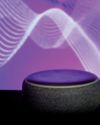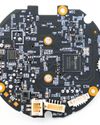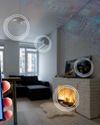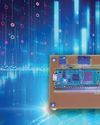
Just as there are invisible spectra of light, there are inaudible sounds. The human eye can't see infrared light at low frequencies and ultraviolet light at high frequencies. For audio, our ears can't detect the high ultrasound frequencies that are useful for things such as television remote controls and medical imaging. Sound also has an inaudible low-frequency component called infrasound.
A few electronic device designs have been published for making ultrasound audible. Most of these use heterodyning to shift the ultrasonic frequencies down to the audible range. The principal purpose of these circuits is to listen to the echolocation calls of bats, which occur at frequencies up to about 200kHz, but more typically between 20kHz and 60kHz. Electronics for such devices are a simple design problem for Circuit Cellar readers, but microphones with sensitivity at ultrasonic frequencies can be quite expensive. The inexpensive ultrasound receivers used in remote controls are not suitable for broadband ultrasonic detection, since they respond to a single frequency, 40kHz, with just a kilohertz bandwidth. If you don't live near a bat cave or highly wooded area, there will be little ultrasound activity.
Winds blowing over uneven terrain, ocean waves crashing onto shorelines, and erupting volcanoes generate infrasound waves that can travel long distances. Heavy vehicles and machinery are other sources of infrasound. Sound is a pressure wave that expands and compresses air over each cycle, and energy is lost during this expansion-compression cycle. Low-frequency waves have fewer cycles per distance than higher-frequency waves, so infrasound travels farther. Nuclear weapons are no longer being tested, but the infrasound from nuclear explosions were detected worldwide. Before supersonic flights of Concorde jets were discontinued, it was discovered that their infrasound emission interfered with the navigation of homing pigeons.
Esta historia es de la edición September 2024 de Circuit Cellar.
Comience su prueba gratuita de Magzter GOLD de 7 días para acceder a miles de historias premium seleccionadas y a más de 9,000 revistas y periódicos.
Ya eres suscriptor ? Conectar
Esta historia es de la edición September 2024 de Circuit Cellar.
Comience su prueba gratuita de Magzter GOLD de 7 días para acceder a miles de historias premium seleccionadas y a más de 9,000 revistas y periódicos.
Ya eres suscriptor? Conectar

New TI MCUs Enable Edge AI and Industry-Leading Real-Time Control to Advance Efficiency, Safety, and Sustainability
Texas Instruments (TI) introduced two new series of real-time microcontrollers that deliver advancements to help engineers achieve more intelligent and secure processing in automotive and industrial applications.

Using Amazon Alexa to Control Custom IoT Gadgets
In part two of his article, Brian describes integrating custom IoT gadgets with Amazon Echo using emulation to receive spoken alarms. In part one, he used emulation and Arduino Cloud services as a middleman.

Holiday Hangover Hardware Hacking
Having too much cheer during the holidays? In this month's article, Colin offers a diversion from the jolly season by urging developers to retreat to the basement to brush up on hardware hacking skills. He shows how a low-cost Raspberry Pi Pico and a TP-Link Tapo C200 smart IP camera could become the next automated bird deterrent or a home automation server.

Datasheet: Microamps Per Megahertz Ultra-Low Power MCUs Minimize Current Consumption
How do chip makers differentiate if many ultra-low power MCUs on the market feature the same processor core? The peripherals and different power states offer various ways to manage current consumption down to microamps per megahertz.

Smart Home Lock Down Matter Provides Security Blanket
As more devices in the smart home connect to the Internet, they become increasingly vulnerable to outside attacks. Developers can now add the latest security measures to their Smart Home devices through Matter.

Basic Pulse Circuits
In part one of a three-part series, Wolfgang wrote how basic pulse circuits help digital circuits, such as embedded boards with ARM processors, deal with pulse trains or bursts of pulses from the outside. In Part 2, he dives into enabling flip-flops, timing parameters, and synchronization, design tasks needed to capture, detect, and filter pulses.

Building a Wi-Fi Router Watchdog
Dev created a watchdog for a Wi-Fi extender using a Raspberry Pi Pico. This monitors Wi-Fi connectivity for his smart home lighting system, which would require a reset twice a year due to rapid power interruptions.

Create Your Own PCBs with a CNC Milling Machine
Using KiCad, CopperCAM, and Candle Software

Performance Bottlenecks in Embedded Linux Solutions Analysis, Identification, and Mitigation
Good performance is a requirement for every technology, and system designers rely on operating systems to ensure fast and smooth transitions in critical applications. Fortunately, Pedro writes, the embedded Linux OS offers ways for finding, analyzing and mitigating performance bottlenecks so embedded systems can deliver the speed and efficiency that end users expect.

Renesas New RA8 Entry-Line MCU Groups Brings High Performance of Arm Cortex-M85 Processor to Cost-Sensitive Applications with Market-Leading CoreMark Performance
Renesas Electronics Corp., a premier supplier of advanced semiconductor solutions, introduced the RA8E1 and RA8E2 microcontroller (MCU) groups, extending the industry's most powerful series of MCUs.